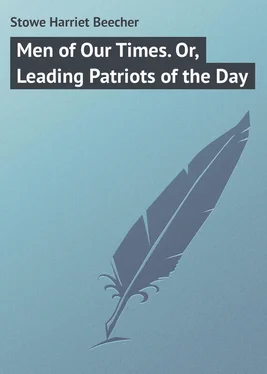Harriet Stowe - Men of Our Times. Or, Leading Patriots of the Day
Здесь есть возможность читать онлайн «Harriet Stowe - Men of Our Times. Or, Leading Patriots of the Day» — ознакомительный отрывок электронной книги совершенно бесплатно, а после прочтения отрывка купить полную версию. В некоторых случаях можно слушать аудио, скачать через торрент в формате fb2 и присутствует краткое содержание. ISBN: , Жанр: foreign_language, foreign_prose, на английском языке. Описание произведения, (предисловие) а так же отзывы посетителей доступны на портале библиотеки ЛибКат.
- Название:Men of Our Times. Or, Leading Patriots of the Day
- Автор:
- Жанр:
- Год:неизвестен
- ISBN:http://www.gutenberg.org/ebooks/46347
- Рейтинг книги:5 / 5. Голосов: 1
-
Избранное:Добавить в избранное
- Отзывы:
-
Ваша оценка:
- 100
- 1
- 2
- 3
- 4
- 5
Men of Our Times. Or, Leading Patriots of the Day: краткое содержание, описание и аннотация
Предлагаем к чтению аннотацию, описание, краткое содержание или предисловие (зависит от того, что написал сам автор книги «Men of Our Times. Or, Leading Patriots of the Day»). Если вы не нашли необходимую информацию о книге — напишите в комментариях, мы постараемся отыскать её.
Men of Our Times. Or, Leading Patriots of the Day — читать онлайн ознакомительный отрывок
Ниже представлен текст книги, разбитый по страницам. Система сохранения места последней прочитанной страницы, позволяет с удобством читать онлайн бесплатно книгу «Men of Our Times. Or, Leading Patriots of the Day», без необходимости каждый раз заново искать на чём Вы остановились. Поставьте закладку, и сможете в любой момент перейти на страницу, на которой закончили чтение.
Интервал:
Закладка:
Like so many of his profession, Mr. Lincoln was very early a politician. Indeed, his devotion to politics interfered very considerably with his gains, and delayed his eminence in his profession. The value to his fellow-countrymen of the political results which he was the means of bringing to pass, is, however, so infinitely beyond any money value, that no regret can be felt at his ambition.
Mr. Lincoln's popularity among his neighbors, his assiduous study of the newspapers, his intense and untiring meditations and reasonings on the political questions of the day, brought him into the political field pretty early and pretty well prepared. It was in 1832, when he was twenty-three years old, that his first candidacy and his first speech took place. The story and speech all together are so short that they can be inserted here in full. On the day of election, then, Mr. Lincoln's opponent spoke first, and delivered a long harangue of the regular political sort. Lincoln, who followed him, completed his oration in just seventy-nine words – less than one minute's talking. This is what he said: "Gentlemen, fellow citizens: – I presume you know who I am; I am humble Abraham Lincoln. I have been solicited by many friends to become a candidate for the Legislature. My politics can be briefly stated. I am in favor of a national bank, I am in favor of the internal improvement system, and a high protective tariff. These are my sentiments and political principles. If elected I shall be thankful, if not, it will be all the same."
He was beaten, however, in spite of his terseness. But in his own district he received all but seven out of 284 votes; and he was never beaten again in any election by the people.
His actual political career, not counting this defeat, began in 1834, when he was chosen member of the State Legislature, and being too poor to afford a horse, walked over a hundred miles to Vandalia to take his seat. He remained a member for four successive terms of two years each. Mr. Douglas became a member two years after him, in 1836; the two men quickly became party leaders on their respective sides of the house, and thus their political courses and their political rivalries began almost together. At the two latter of his four legislative terms, Mr. Lincoln was the Whig candidate for Speaker, and once lacked only one vote of being elected. Mr. Lincoln's eight years' service in the State Legislature was busy and useful, and gave him an assured and high position in his party. The work done was usually of a local character, of course, its most important departments being that of the improvement of internal communication by railroad and canal, and that of education.
But even on the question of slavery, the one significant occasion for utterance which arose was promptly improved, and in such a manner as to show both the settled feelings and convictions of Lincoln's mind on the subject, and his characteristic practice of restricting his official utterances strictly to the exigencies of the case. His dislike of slavery was not only the consequence of his inborn sense of justice and kindly feelings, but was his direct inheritance from his parents, who left Kentucky and settled in Indiana expressly to bring up their family on free instead of slave soil. In March, 1839, some strong pro-slavery resolutions were passed by the Legislature of Illinois, and by large majorities in both houses. This, the few anti-slavery members could not prevent. But Mr. Lincoln and Mr. Dan Stone took the most decided stand in their power on the other side, by putting on record on the House journals a formal protest against the resolutions. In this protest, they declared views that would to-day be considered very conservative, about legal or political interference with slavery; but they also declared in the most unqualified manner, and in so many words, their belief "that the institution of slavery is founded on both injustice and bad policy."
At the end of his fourth term, Mr. Lincoln declined a further nomination, finding it absolutely necessary to devote more time than hitherto to his own private affairs. When he thus left the Legislature of his own accord, he was virtually the leader of his party in the State, having reached that creditable and influential though unofficial position by his own good qualities, in the eight years of his life ending with his thirty-fifth. It was a great achievement for a man no older, and so destitute of outside help.
For four years Mr. Lincoln now remained a hard-working lawyer, although he did a good deal of political work besides, particularly in "stumping" Illinois and Indiana in the Presidential canvass of 1844. In this campaign Mr. Lincoln made many strong and effective speeches for Henry Clay, and though his candidate was beaten, his own reputation as a politician and speaker was much increased. In 1846 he was elected to Congress as a Whig, and his extreme popularity at home is shown by the fact that his own majority on this occasion was 1,511 in the Springfield district, while Mr. Clay's had been only 914.
During this congressional term, Mr. Lincoln met the grinding of the great question of the day – the upper and nether millstone of slavery and freedom revolving against each other. Lincoln's whole nature inclined him to be a harmonizer of conflicting parties, rather than a committed combatant on either side. He was firmly and from principle an enemy to slavery, but the ground he occupied in Congress was in some respects a middle one between the advance guard of the anti-slavery army and the spears of the fire-eaters. He voted with John Quincy Adams for the receipt of anti-slavery petitions; he voted with Giddings for a committee of inquiry into the constitutionality of slavery in the District of Columbia, and the expediency of abolishing slavery in that district; he voted for the various resolutions prohibiting slavery in the territories to be acquired from Mexico, and he voted forty-two times for the Wilmot Proviso. On one occasion, he offered a plan for abolishing slavery in the District of Columbia, by compensation from the national treasury, with the consent of a majority of the citizens. He opposed the annexation of Texas, but voted for the bill to pay the expenses of the war. He voted against paying for slaves as property, when that question came up in the celebrated Pacheco case, and thus recorded his denial of the right of owning men, or of its acknowledgment by the nation.
During this term of service in Congress, Mr. Lincoln was a laborious and faithful public servant; always present to vote, and always ready for business; and his speeches, homely and rough as they were, showed so much broad strong sense, natural rectitude, sincerity, and power of reasoning, as to give him a good position as a debater. He declined a re-election; tried for but did not obtain the commissionership of the Land Office at Washington; declined appointments as Secretary and as Governor of Oregon Territory; returned to his home and his work; was unsuccessful as candidate for the United States Senate in the Illinois Legislature of 1849–50; and labored industriously at his profession, until the repeal of the Missouri Compromise, the Kansas Nebraska Bill, and the violences and iniquities connected with them, called him once more into public life.
He now took the field, heart and soul against the plot to betray our territories into slavery, and to perpetuate the power of that institution over the whole country. Henceforth he was all his life a public man; first a prominent champion in the decisively important state of Illinois, and afterwards the standard bearer and the martyr of Freedom in America.
That contest in Illinois, in which the political doctrines of Mr. Douglas were the central theme of discussion, and in which he himself on one side and Mr. Lincoln on the other, were the leading speakers and the controlling minds, was an important act in that great drama of emancipation which culminated in the Rebellion. In Mr. Lincoln's life it was if possible still greater in comparative importance; for his debates with Douglas determined his reputation as a speaker and a public man, and lifted him to the position from which he stepped into the presidential chair.
Читать дальшеИнтервал:
Закладка:
Похожие книги на «Men of Our Times. Or, Leading Patriots of the Day»
Представляем Вашему вниманию похожие книги на «Men of Our Times. Or, Leading Patriots of the Day» списком для выбора. Мы отобрали схожую по названию и смыслу литературу в надежде предоставить читателям больше вариантов отыскать новые, интересные, ещё непрочитанные произведения.
Обсуждение, отзывы о книге «Men of Our Times. Or, Leading Patriots of the Day» и просто собственные мнения читателей. Оставьте ваши комментарии, напишите, что Вы думаете о произведении, его смысле или главных героях. Укажите что конкретно понравилось, а что нет, и почему Вы так считаете.












